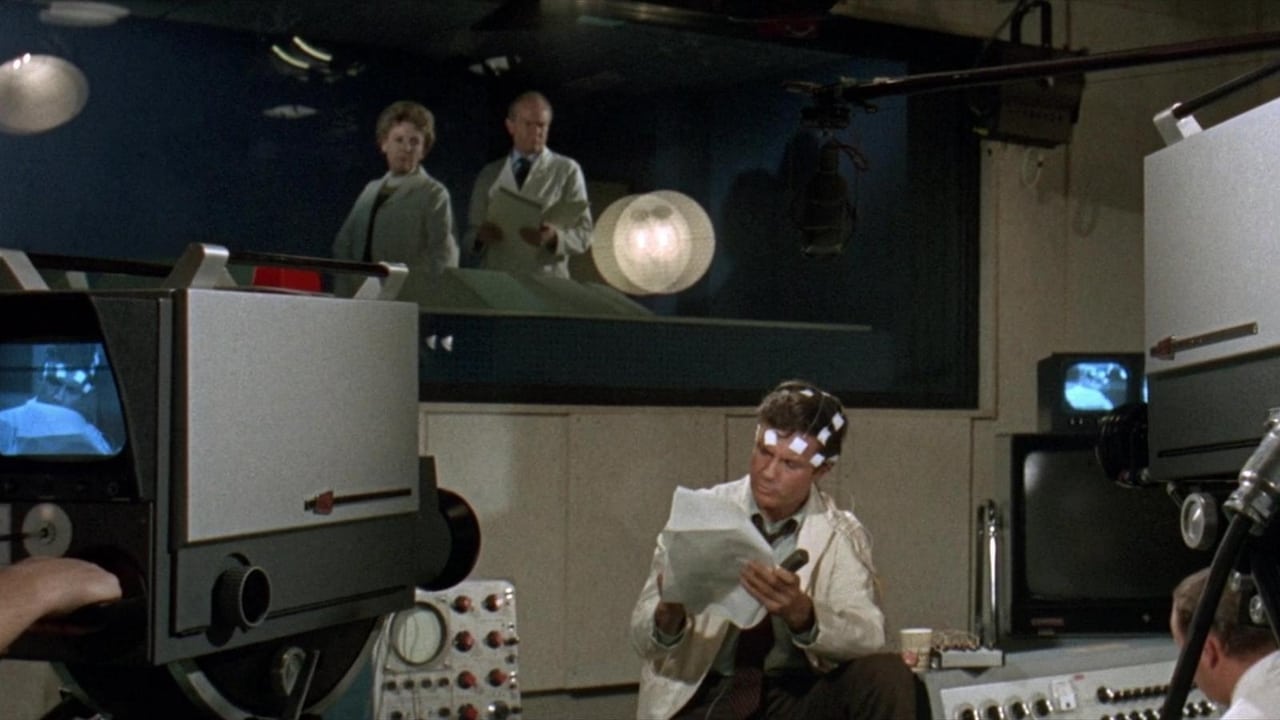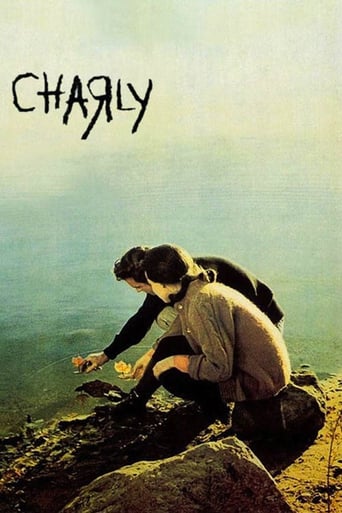

Self-important, over-dramatic, uninspired.
... View MorePlot so thin, it passes unnoticed.
... View MoreIt really made me laugh, but for some moments I was tearing up because I could relate so much.
... View MoreThrough painfully honest and emotional moments, the movie becomes irresistibly relatable
... View MoreBased on "The 2 Worlds of Charlie Gordon," this 1968 heartbreaking film was excellent. Cliff Robertson, as Charly, gave a rousing performance and in an upset to rival 1947 when Loretta Young ("The Farmer's Daughter") beat out Rosalind Russell for "Mourning Becomes Electra, Cliff Robertson won the best actor award despite the fact that Peter O'Toole was heavily favored to win for "The Lion in Winter."Robertson gave everything in his award winning performance. As a retarded individual, he takes an experimental drug and reaches genius capacity with it. What he is not told is that he will eventually revert back to his retardation. How he reverts back was memorably shown.
... View More"Charly" is a flawed, maudlin, poignant, unintentionally laughable, heavy handed, sometimes grotesque, inescapably dated, unforgettable movie."Charly" is the story of a mentally retarded adult man (Cliff Robertson) who is experimented on by two scientists, Dr. Strauss and Dr. Nemur (Lilia Skala and Leon Janney) Each is terrifying. Skala forces smiles through clenched teeth and a German accent; Janney is a humorless, deep-voiced skull. These scientists have been able to dramatically increase the intelligence of Algernon, a mouse. Without so much as a signed, informed-consent release form, Charly is experimented on, as well. He, too, becomes dramatically more intelligent.Newly smart Charly falls in love with his teacher, Alice Kinian (Claire Bloom.) She rejects him at first, but they connect. Shortly thereafter, Algernon dies. The same fate awaits Charly, but he will lose his intelligence first. He dismisses Alice, and, unlike Bette Davis in "Dark Victory," dies off camera.Like many other reviewers here, I read "Flowers for Algernon" and saw this movie as a child. I never forgot either. I remember, even as a kid, feeling embarrassed for being so moved by the story, because it is so blatantly manipulative. And yet it is undeniably powerful.I resent the film's masochistic wallow in Charly's victimization by his coworkers. One scene of Gimpy (Edward McNally) instigating trouble at the bakery where Charly works, would have done the job of communicating the torment of being a retarded man. But the movie includes several such scenes: Gimpy and the gang humiliating Charly with bread dough packed into his locker at work, with a juke box trick, by telling him to go stand on a deserted street corner at night and wait for snow, and with a dough machine. Finally, when Charly becomes more intelligent, they gang up on him and fire him. These vignettes have the ring of truth, but their repetition only serves to encourage the viewer to wallow in pity for Charly, and to become enraged at his tormentors.The movie is very much of its time. The bakery villains are working class white men; Straus and Nemur, and their colleagues in a conference audience who shoot questions at Charly, are soulless scientists and authority figures: classic 1960s villains, reflecting the obsessions, paranoias, resentments and scapegoating of sixties hippies. The psychedelic sequence, where a wounded Charly deals with Alice's rejection of him by taking drugs, having orgies, and growing his hair long, is a goofy time capsule of 1968's values, obsessions, and grandiosity. The Ravi Shankar soundtrack, that makes use of flutes, harpsichords, and sitar, is obtrusive in its shouting, "1968!" The split screen effect also calls attention to itself. The only stars who could carry split screen off were Rock Hudson and Doris Day.Cliff Robertson won an Academy Award for his performance as Charly, and it is that kind of performance an actor playing a retarded man that was so harshly mocked in "Tropic Thunder." The fact is that Robertson creates two believable, very different characters: retarded Charly and intelligent Charly. When his "non-retarded" voice first breaks through, when he asks Alice if her fiancé loves her, it's like a teenage boy's voice breaking.Claire Bloom exhibits her usual restrained sexuality and hints at an inner disciplinarian / dominatrix. When smart Charly first lunges at her, she calls him a "stupid moron," which is completely unbelievable, but serves the movie's need to be as maudlin as possible. The romance between Charly and Alice is disturbing to anyone with a sense of the ethics of teacher-student relationships, but the film isn't interested in exploring this relationship with any seriousness. Rather, it just wants to extract as many tears as possible. Once Charly and Alice connect, the camera moves as far away from them as possible. As dewy landscape shots parks, ponds, toy trains parade across the screen, Robertson and Bloom perform voice-over readings of what sounds like Rod McKuen poetry. It's all so 1960s, so dated, so much of a cheat of the viewer. The film is very willing to spend lots of time in close observations of Charly's workmates tormenting him, but has no time to develop a real relationship between Charly and Alice.The movie undercuts its own message in its final scenes. When Charly realizes that he will become retarded again, he is haunted by terrifying, disturbing ghosts of his past, retarded self. These retarded-Charly-ghosts have no dignity, no value. If the movie wants to tell us that retarded people are primarily people, just like anyone else, it undercuts that message by making smart Charly's past and future retarded self so disturbing.For all of its flaws, this is a movie very worth seeing. There are genuinely touching scenes, such as when Charly helps a retarded man clean up after dropping glasses in a bar.Too, the film raises profound questions, questions that anyone who has lost a loved one to Alzheimer's has asked: where is the essence of the soul? In the intellect? Or somewhere impossible to locate? Finally, "Charly" exerts a real tug on the heart. Whether that is because schlock is more powerful than art, or because there is art here under all the schlock, is topic for a dissertation, not a relatively short review.
... View MoreCliff Robertson earned an Academy Award for playing the title role based on the novel by Daniel Keyes entitled "Flowers for Algernon." His portrayal is heartbreaking and you can't help but feel for the character who is the butt of so many jokes by his so-called colleagues and friends at his workplace, a bakery. Seinfeld's Barney Martin and Dick Van Patten play his co-workers. The divine Claire Bloom (who should be made a Dame) is the sympathetic attractive teacher. Ruth White plays the landlady in one of the last film roles before her death in 1969 from cancer. The setting is filmed on location in Boston, Massachusetts.
... View MoreLet me just start off by saying that I absolutely loved the book "Flowers for Algernon", which we read in my lit class at school. It was probably the best book I've ever been forced to read. Also at our school, they made us watch this movie after finishing it. I found this film at best a poor adaption of a great novel and at worst, a disastrous attempt at surrealist film-making.First, the positives: The actors, especially male and female leads are excellent and have a definite chemistry together on screen, however they seem a bit confined by the material they are given to perform.Now, the far more lengthly section of my review: the negatives. 1. Cinematography. The whole movie seems to have been shot in a style to suggest being on a bad acid-trip (not that I would know the feeling.). Many scenes are an endless, ridiculously over metaphorical montage where it would have been much simpler and more effective to use a more straight forward approach. For some odd reason, the director also decided to use a split screen effect at certain arbitrary points in the film for no apparent reason other than possibly the notion that it looked cool.2. Writing. This is probably my biggest problem with the film. The writing in the movie is simply incredulous, seeing as it not only departs from the book in unnecessary ways, which I will detail later, but it also changes the plot in ways that make no logical sense, such as changing it so that the doctors don't tell Charlie that the effects of the operation may not be permanent, not something a 20th century medical professional is likely to do given that a patient must give informed consent before undergoing an operation. The beginning portion drags on, filled with scenes of Charlie doing childish activities such as playing on a slide or driving bumper cars to the point where one feels like jumping up on one's chair and screaming "We get it! He's retarded!". The most nonsensical plot twist is the series of scenes in which Charlie, not being emotionally developed, tries to force himself on Ms. Kinnian and is, as a result, slapped and called "A stupid moron", then departs on a motorcycle trip for no readily apparent reason and comes back and is suddenly sleeping with Ms. Kinnian, whose fiancée just magically disappears, which leaves the audience scratching its head and saying "Didn't she just slap and insult him two scenes ago? I wish my life worked like that."3. The Ending. I have given this it's own section because I feel it deserves special attention. At the end of the novel, the reader basically has two ways of interpreting it: Relocation or Suicide (the latter being my preferred interpretation). However, this version removes all of the guesswork by simply giving you no clues as to what happens after he regresses back to his former state. Instead, you get a long, stretched out scene in which he is chased by his former self through long, white hallways for about five minutes, and one is left with a similar reaction I mentioned having during the beginning portion. This is one of the few movies in which I have been shocked to see the end credits, as it just ends with a freeze-frame of Charlie on the teeter-totter and leaves the story completely unresolved.I'm sorry if the above review seems a bit rantish, however these are simply my criticisms of the film. If you enjoyed it, then that's all well and good. To each his own.
... View More